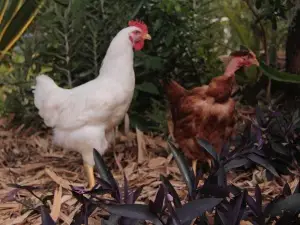
Chickens will try their best to hide that they’re ill or that there is something wrong with them, but their bodies will betray them eventually.
If your bird has an intestinal blockage then there will be signs. This article explores the signs of an intestinal blockage in your chicken.
Table of Contents
Signs of an intestinal blockage in chickens:
Intestinal blockages can be quite dangerous for chickens.
If food is not moving freely through your bird’s body this can bring about a whole host of issues.
Here are the signs of an intestinal blockage in your chickens:
Constipation:
Because food can’t properly pass through the bird’s intestines it cannot be broken down, turned into feces, and leave the bird’s body.
This food will collect in the bird’s intestines causing the bird to become constipated.
Smaller droppings:
If the bird’s blockage is not too large, then some foods will be able to pass the intestines and come out of the bird.
Not all foods will be able to pass but the food that does pass will form small droppings.
Your bird’s droppings may also come out as mostly urates, or fluid, and small amounts of green/brown droppings may come out too.
Weight loss/emaciation:
The intestines are where most nutrients are absorbed. After being absorbed they are sent throughout the bird’s body.
If there is a blockage in the intestines, and food isn’t absorbed, then the bird will start to lose weight and become emaciated.
Appetite loss:
The bird’s body causes the bird to become hungry when food moves through the digestive system.
If food is not moving through the bird’s body, because of an intestinal blockage, then the bird will not want to eat.
Lethargy:
A variety of conditions can cause your chickens to become lethargic, and a blockage in the bird’s intestinal tract is one of them.
Because food isn’t properly being absorbed, the bird will be low on energy and will become lethargic.
Isolation:
Your bird will isolate itself when it isn’t feeling well, this will happen whether the bird has a disease, is injured, or has an intestinal blockage.
What to do:
This is quite a serious condition and should not be taken lightly. It can also be difficult to diagnose and treat.
For this reason, your vet, or better yet, your avian vet, will know how to treat the blockage in your bird.
So, making an appointment for your bird to see the vet is the best course of action.
You can keep your bird isolated until you can get the bird to the vet.
Serve the bird food and water and limit stress on your chicken while it is in isolation.
If you enjoyed this article then you may also be interested in other bird related articles. Here are some articles that you may be interested in: Why Does My Chick Look Like It’s Gasping For Air?, What To Do If A Chick Is Gasping For Air, 2 Day Old Chick Gasping, Chick Gasping And Chirping, Chick Gasping After Drinking, Baby Chick Vomiting, Baby Chick Leaning To One Side, How To Force Feed A Baby Chick, Chicken Keeps Opening Mouth Like Gagging

